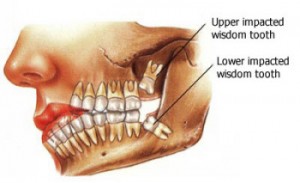Why Corrective Jaw Surgery is Often Necessary

Corrective jaw surgery can be completed on either the upper or lower jaw (or both) to correct a variety of dental and skeletal irregularities. It does this by moving the jaw into a position that is more balanced and functional. While the surgery itself is performed by us, as oral and maxillofacial surgeons, we will work with your dentist or orthodontist.
What is a Malocclusion
A malocclusion is a medical term for jaws that do not fit together correctly. Malocclusions can be caused by a congenital defect, an injury or, very simply because the jaw did not develop at the correct rate. While it is true that few people's jaws are perfectly aligned, the misalignment is rarely severe enough to warrant surgery.
Under normal circumstances, when a person closes their mouth, the upper teeth fit slightly over the lower set, and the points of the molars fit into the depression in the opposite molar. However, if the jaws are misaligned, the upper teeth may protrude beyond the lower ones, which is called an "over-bite." On the other hand, an "under-bite" is caused by the lower teeth protruding beyond their upper ones. On occasion, the upper teeth can even come down to one side of the lower ones, or they do not touch at all. Surgery can correct this to improve your appearance and to prevent any excessive wear on your teeth.
Correcting The Problem
Corrective jaw surgery is usually done to address functional problems, since a misaligned jaw can cause chronic pain or discomfort, uneven and excessive wear on the teeth, and often affect the ability to bite and chew, or even breathe normally.
Most people who have misaligned jaws are extremely conscious of their profile. A lower jaw that sticks out often gives the person the classic bulldog look, while the opposite situation can make them appear "weak-chinned". Because Orthognathic surgery corrects these problems, it can, and usually does, drastically improve the appearance as well. If you are in this situation, we can use modern computer imaging to give you an idea of what you will look like after surgery.
Orthodontics
Braces can sometimes correct a misaligned jaw. However, when they cannot, corrective jaw surgery is used in combination with an orthodontic treatment. In order to move your teeth into the position they will need to be in after the surgery, your orthodontist will fit you with braces several months earlier. The length of time, you will wear braces depends on how much preparation is involved. You may initially feel that the situation is getting worse not better, but this is temporary. Once your jaw is repositioned with surgery, your teeth should align. In some cases, braces will be put back on for a few months to complete the process of straightening your teeth.
While the road to a perfectly aligned jaw is a long one that requires commitment on both sides, the final result will be more than worth it. Not only will you be free of any pain and discomfort you may have experienced, and be able to chew and breathe more easily than you ever have, but the surgery can make a substantial difference in your appearance.
Check out what others are saying about our services on Yelp: Oral Surgeon Lee's Summit
Explore additional topics covered on our website:
Back to top of Oral Surgeon Lee's Summit.


